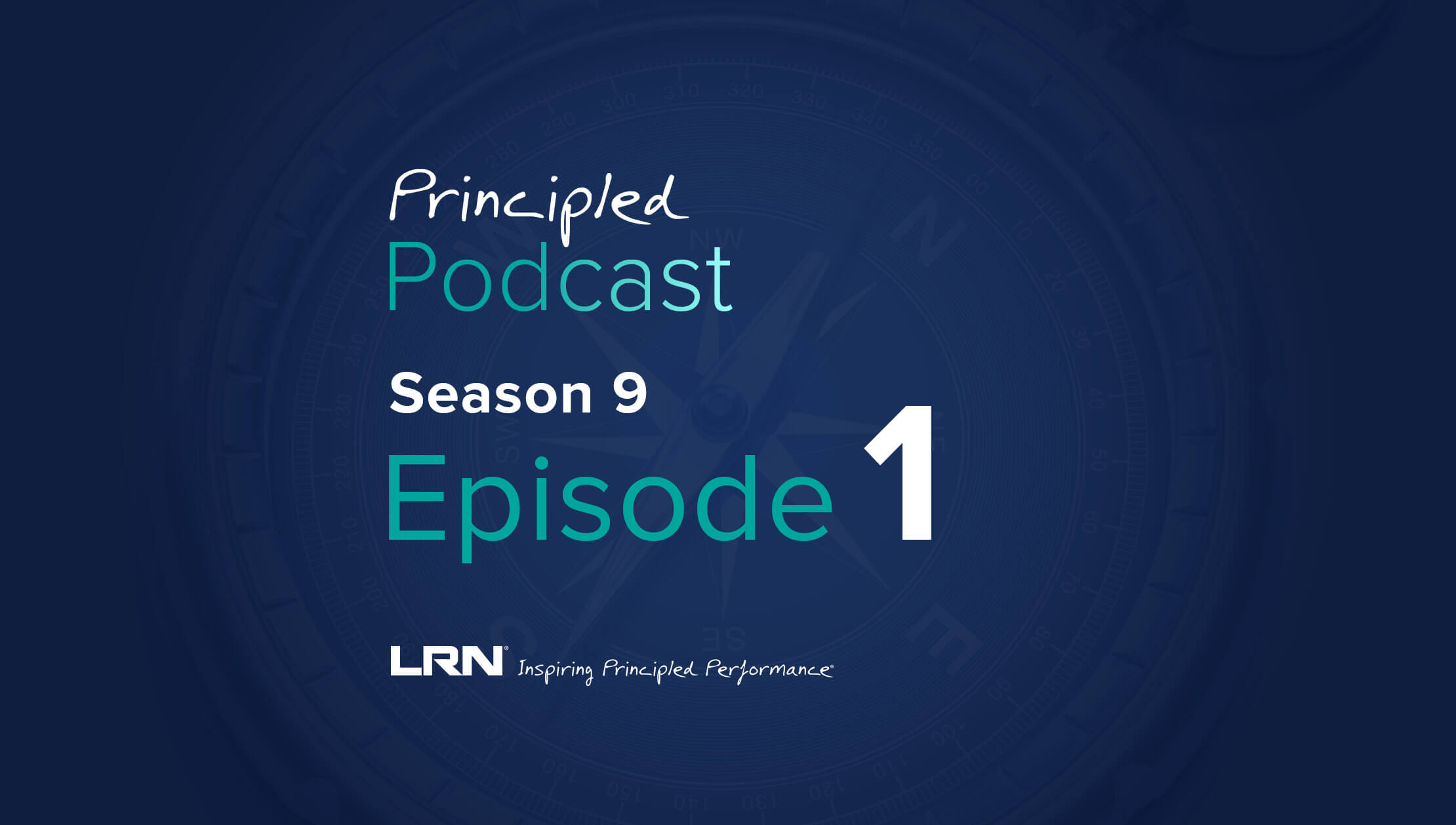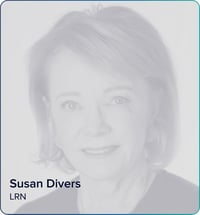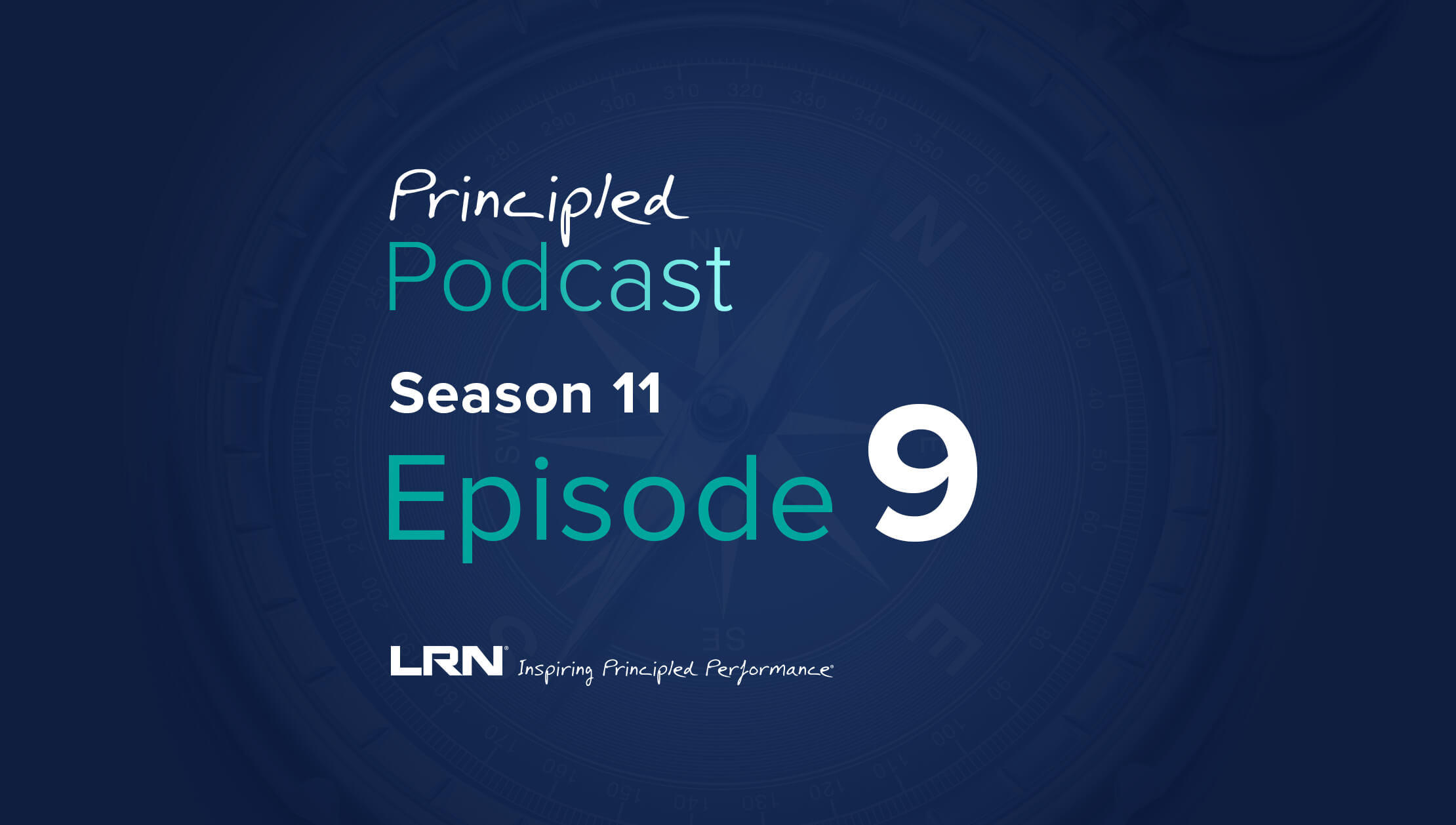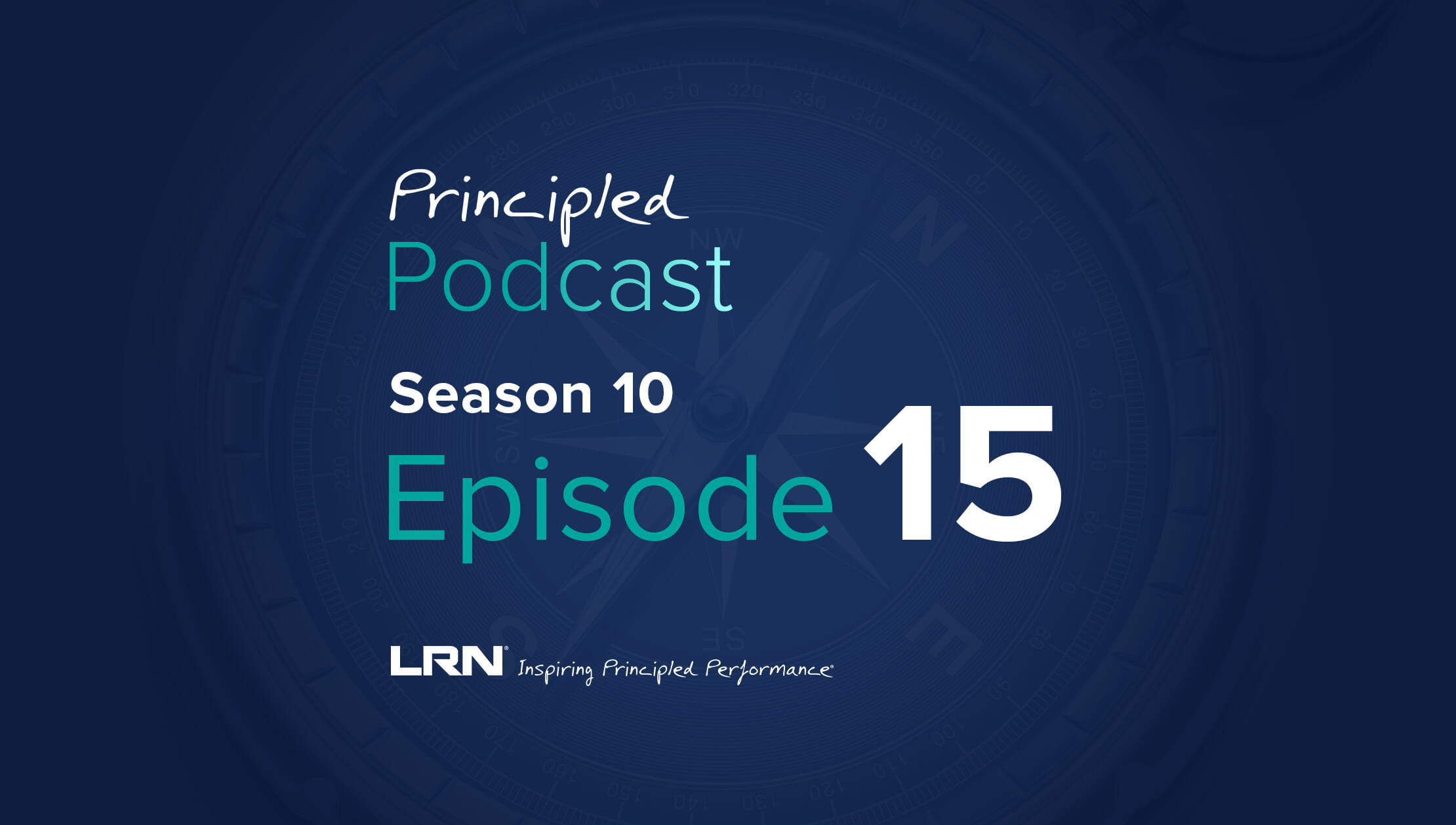What you'll learn on this podcast episode
There are clear challenges for the road ahead in 2023—economic headwinds, geopolitical conflict, supply chain disruption, stakeholder activism, increased scrutiny by government regulators. How exactly are E&C programs navigating these risks, and how are they evolving in response? In this episode of the Principled Podcast, host Emily Miner talks about how values can sustain ethical performance—the essential element of effective E&C programs—and absorb the shocks of unanticipated business realities with her colleague, Susan Divers. Listen in as the two draw insights from the 2023 edition of LRN’s annual Ethics & Compliance Program Effectiveness Report, which is available now to download.
Get the 2023 Ethics & Compliance Program Effectiveness Report.
Where to stream
Be sure to subscribe to the Principled Podcast wherever you get your podcasts.
Guest: Susan Divers
Susan Divers is the director of thought leadership and best practices with LRN Corporation. She brings 30+ years’ accomplishments and experience in the ethics and compliance arena to LRN clients and colleagues. This expertise includes building state-of-the-art compliance programs infused with values, designing user-friendly means of engaging and informing employees, fostering an embedded culture of compliance, and sharing substantial subject matter expertise in anti-corruption, export controls, sanctions, and other key areas of compliance.
Prior to joining LRN, Mrs. Divers served as AECOM’s Assistant General for Global Ethics & Compliance and Chief Ethics & Compliance Officer. Under her leadership, AECOM’s ethics and compliance program garnered six external awards in recognition of its effectiveness and Mrs. Divers’ thought leadership in the ethics field. In 2011, Mrs. Divers received the AECOM CEO Award of Excellence, which recognized her work in advancing the company’s ethics and compliance program.
Before joining AECOM, she worked at SAIC and Lockheed Martin in the international compliance area. Prior to that, she was a partner with the DC office of Sonnenschein, Nath & Rosenthal. She also spent four years in London and is qualified as a Solicitor to the High Court of England and Wales, practicing in the international arena with the law firms of Theodore Goddard & Co. and Herbert Smith & Co. She also served as an attorney in the Office of the Legal Advisor at the Department of State and was a member of the U.S. delegation to the UN working on the first anti-corruption multilateral treaty initiative.
Mrs. Divers is a member of the DC Bar and a graduate of Trinity College, Washington D.C. and of the National Law Center of George Washington University. In 2011, 2012, 2013 and 2014 Ethisphere Magazine listed her as one the “Attorneys Who Matter” in the ethics & compliance area. She is a member of the Advisory Boards of the Rutgers University Center for Ethical Behavior and served as a member of the Board of Directors for the Institute for Practical Training from 2005-2008. She resides in Northern Virginia and is a frequent speaker, writer and commentator on ethics and compliance topics.
Emily Miner is a director in LRN’s Ethics & Compliance Advisory practice. She counsels executive leadership teams on how to actively shape and manage their ethical culture through deep quantitative and qualitative understanding and engagement. A skilled facilitator, Emily emphasizes co-creative, bottom-up, and data-driven approaches to foster ethical behavior and inform program strategy. Emily has led engagements with organizations in the healthcare, technology, manufacturing, energy, professional services, and education industries. Emily co-leads LRN’s ongoing flagship research on E&C program effectiveness and is a thought leader in the areas of organizational culture, leadership, and E&C program impact.
Prior to joining LRN, Emily applied her behavioral science expertise in the environmental sustainability sector, working with non-profits and several New England municipalities; facilitated earth science research in academia; and contributed to drafting and advancing international climate policy goals. Emily has a Master of Public Administration in Environmental Science and Policy from Columbia University and graduated summa cum laude from the University of Florida with a degree in Anthropology.
Principled Podcast transcription
Intro: Welcome to the Principled Podcast, brought to you by LRN. The Principled Podcast brings together the collective wisdom on ethics, business and compliance, transformative stories of leadership and inspiring workplace culture. Listen in to discover valuable strategies from our community of business leaders and workplace change-makers.
Emily Miner: There are clear challenges for the road ahead in 2023, economic headwinds, geopolitical conflict, supply chain disruption, stakeholder activism, increased scrutiny by government regulators. At LRN, essential lesson from our ongoing research and work with thousands of organizations, is that a values-based approach to governance, culture and leadership is crucial. It builds and sustains ethical culture, which is the essential element of effective ethics and compliance programs, and it correlates strongly with reduced risk and better business outcomes. But how exactly are E&C programs navigating the risks and challenges on the road ahead, and how are they evolving in response?
Hi, welcome to the first episode of season nine of LRN's Principled Podcast. I'm your host, Emily Miner, Director of Advisory Services at LRN. I'm joined today by my colleague Susan Divers, the Director of Thought Leadership and Best Practices with LRN'S Advisory Group. We're going to be talking about how values can sustain ethical performance and absorb the shocks of unanticipated business realities. To do so, we'll draw insights from our new 2023 edition of LRN's Annual Ethics and Compliance Program Effectiveness Report, of which Susan is our lead author.
Susan, thanks for joining me on the Principled Podcast. I'm excited that we're both kicking off the ninth season together.
Susan Divers: Oh, Emily, it's always a pleasure to talk to you. Thanks for having me.
Emily Miner: As a starting point for our discussion and for those listeners that may not be familiar, what is the Ethics and Compliance Program Effectiveness Report, or as we familiarly call it internally at LRN our PEI, our Program Effectiveness Index?
Susan Divers: Well, I can explain both of those points. The Program Effectiveness Report, we've been doing that longer than I've been at LRN, so I'd say we've been doing it at least 10 years. And what it is, is every year we do a survey globally of ethics and compliance professionals, and we ask them questions about their program. And we also rank the programs that we survey in terms of highly effective, medium impact, and less than effective programs.
And to do that, we use what's called the PEI, or the Program Effectiveness Index. And we can talk about that a little bit later, how the PEI works and why it's actually better than just measuring activities. But in a nutshell, the annual Program Effectiveness Report gives us an opportunity to see how programs are doing in practice, what's working, what isn't working, and what are the best practices that are starting to emerge.
Emily Miner: Awesome. Thank you for that overview. And we always have a sort of a theme or an overarching focus. Our past two Program Effectiveness Reports really looked at the impact of COVID on ethics and compliance programs and on organizations more broadly. And then before that, in 2020, we explored the root causes of misconduct. So what is the overarching theme of this year's, the 2023 study?
Susan Divers: The overarching theme, Emily, is really how to be resilient and continue to meet the unprecedented challenges, that not only ethics and compliance programs, but businesses generally and indeed other institutions, are facing. To look back just for a minute, the last couple of years of course, we had COVID and all of the disruptions that that brought. And then this last year, in February, we had the Russian invasion of the Ukraine, which I think it's fair to say was not anticipated.
And that's caused a tremendous amount of a different kind of disruption. It's really disrupted supply chains. And when you combine that with what's happening in China with the disruption of the supply chains there and some really big human rights issues, you have a very changed world. So we wanted to look at how ethics and compliance programs were responding to those ongoing challenges.
Emily Miner: You mentioned in the initial description of what the Program Effectiveness Report is, is that it's an annual global survey that we do. And that's an evolution really over the past few years. When we first started doing this research some 10 years ago, as you mentioned, I have to say it was pretty US-centric. But now, and in the past several years, we have fairly equal representation across North America, Europe, Asia, some slightly less representation in some other geographic markets.
How has this shift from really a US or North American centric data set to a global data set impacted the results that we're seeing year-over-year, and the insights that we've uncovered through this research?
Susan Divers: Well, that's a really interesting question. What our results say is that there's basically been an acceptance, I would say globally, that having a robust ethics and compliance program is a really good idea. It's no longer a US idea or maybe a North American idea or a European one, it's global. And I think there's also been an acceptance of what an effective program should really look like and what the elements of it should be.
So that's a really interesting development. I think even five years ago, you might not have really seen that in the results. And we have seen some areas of the world that lag behind, notably Japan. But overall, even having said that, ethics and compliance programs are trying to do pretty much the same thing and largely in the same way.
Emily Miner: Yeah. And I think it's been interesting, for me, because I've had a hand in doing the analysis of the datas, it's been interesting for me to look at the global variation that we're seeing in the results and where there are similarities, and there are a lot of similarities across the different geographies for which we have data.
But then there are some, I think Germany had a slightly more focus on the use of data. And I recall another, I think it was Canada, had a slightly more focus on employee engagement. So just each sort of the slight variations, or sometimes more significant variations that we're seeing in our global dataset, is interesting to parse out. And of course it enables us to give this global view, but also a more localized slice for ethics and compliance professionals around the world.
Susan Divers: Absolutely.
Emily Miner: So let's talk about the PEI, you mentioned that, the Program Effectiveness Index. And it's unique in that we determine program effectiveness based on key indicators of ethical culture, as opposed to a list of program activities. We ask eight questions that measure three areas of critical workplace behavior. Ethical decision-making, organizational justice, and freedom of expression. And we use these items, or the answers to these items, to categorize programs as high impact, medium, or lower impact. And then we look at how program activities, program priorities, ethic and compliance standing in the organization, how it's operationalized, et cetera, vary across the different program types. And this approach is different, and I think we would argue better, than other E&C program surveys out there that maybe focus a little more on program activities, reporting on those program activities.
Can you talk about this a little bit, and just in terms of the methodology. How does that methodology influence the kind of insights that we're able to explore?
Susan Divers: I'll be happy to do that, Emily. Before I do, I do want to tie our approach to what's now become accepted wisdom in the E&C space. And that's the, there's been too much focus in the past, as we both know, on paper programs and checklists, and as you mentioned, reporting activities. "We trained this number of people." "We redid our code of conduct twice in the past three years." There's been a recognition, particularly by regulators, that that's meaningless if your program doesn't have impact and effectiveness. And what I mean by that is if it doesn't actually change behavior or promote ethical behavior.
So by focusing on cultural factors, such as those ones that you just mentioned, that's a much more meaningful way to try to gain insight into what programs do better. And as you know, since we've been doing that, we've really seen a very strong correlation between values-based programs, rather than the ones that rely predominantly on rules and strong performance.
Emily Miner: Yeah, absolutely. And thank you for making that connection. Following or watching particularly the DOJ's guidance and how it's evolved over the past four years or so, it has been interesting for me to watch the increased emphasis on culture and specificity as well. When we think about the 2020 guidance compared to the 2016 guidance, for example, there's so much more language and focus around ethical culture and whether your program works in practice. That's, of course, the third foundational question that is asked in the guidance. So I appreciate that you brought that connection back.
And I think where we've seen that as well in the data, when we look year-over-year, that pool of programs that we characterize as highly effective or having a high impact on their organizations is also growing. And the gap between the medium impact and the high impact program on some of the other questions that we ask is also narrowing as we see more organizations bring a focus to these more behavioral aspects of how we influence ethical behavior and culture.
Yeah, so okay. I want to bring back a little bit to the question of the methodology and how that influences the insights that we are able to explore in our research, looking at the high, medium, and low and the ethical culture indicators. Can you talk about that a little bit?
Susan Divers: Sure. Well, by asking questions that focus on values at work, in the workplace, like levels of trust, levels of respect, levels of organizational justice, you're immediately shifting the focus towards effectiveness and impact. In other words, the program may look one way, but what does it do? And that, again, is the values lens that really strongly emerges in our research.
And what we're also seeing, interestingly, and this year we had close to 1860 respondents worldwide, what we're seeing is that those percentages of high performing programs, middle performing programs and less effective ones, generally hold fairly consistently across the world, which I think is really interesting. And I think that's because one of the differences we've seen is that high performing programs really are very proactive, very employee focused, constantly evaluating and improving. And then there's another category of programs which is much more sort of, "Okay, we've got a program. It may be in a corner over here, but that's enough for us." And so I think that gap is widening, and I think the PEI index is a really good way to get that insight.
Emily Miner: Okay. Let's dig into the actual findings. What are the top three insights you want our listeners to walk away with?
Susan Divers: Well, I think the first, Emily, is to recognize that it's a time of great risk. And as we talked about before, that there's a perfect storm hitting E&C programs. First, the war in the Ukraine has just created major risks in trade controls and the supply chain area. Essentially you have to screen everybody you're doing business with and ensure that it's not a sanctioned entity. And it's not just sanctions on Russia, it's sanctions on China and sanctions on Iran, and a lot of restrictions on what can be transferred, whether it's technology or hardware. So that creates an enhanced risk. And in the previous questions we were talking about, I think I mentioned that Deputy Attorney General Lisa Monaco has described trade controls as the new FCPA. That says it all.
So the first is to realize that it's a time of great risk. And it's also, what we're seeing in our report is that people are reporting that outmoded internal systems are really holding them back from improving program effectiveness, and that they've also got budget limits and staff shortages. What they're being asked to do is increasing, and the resources that they have to do it with look like they're decreasing.
And then the second one is that this has been true for a while, but it's even more true, in that there's a laser focus on effectiveness. And that's coming not only from the regulators, but also from the E&C teams themselves. I don't think I get on a call these days without that question coming up, "How do we know that our program's working? How do we know that our training's effective? How do we know that we're actually preventing misconduct?"
And in terms of training, for example, as you know, our platform has great capability in that area, such as TestOut, measuring time spent on learning subjects, quizzes. And we've also got various tools that we can use to help with that, like the ECPA, our culture survey, or a program evaluation. And now we've got a mini culture pulse survey that can be embedded with courses. And those kinds of realtime insights as employees are interacting with E&C programs are frankly much more valuable than the number of people that you train.
And then we're also seeing a real demand for interactive codes of conduct, because those give you data metrics, as do interactive policies. And then finally, the new must-have is really data analytics. I mean, that's been gathering steam for several years now, but the Department of Justice just hired a former CCO from Anheuser-Bush, Matt Galvin, who was a real pioneer in that area. And you can expect Matt is going to really influence the department's expectations, that when you do interact with regulators, you're going to be able to show them real data. Indicating that your program is not only mitigating risk, but that it's responding to red flags or hotspots.
And then last but not least, we're really seeing much more of a gap between high performing programs and those that are less effective. And you and I have talked about the phenomena where people set up a program and great, they've got it set up and it trudges along and they don't really think about it a whole lot. And that's one group of programs. And the other group, the high performing, are constantly improving and constantly evaluating what they're doing. And especially during the pandemic, those programs got very focused on employee interaction and helping employees use the E&C program. And reaching out to them and making it as easy as possible. We have that great example, two Program Effectiveness Reports ago, where Dell moved all of their annual training onto a mobile app. And that's a great example.
And then it goes kind of without saying, but high performing programs do a better job of impacting and influencing business decisions. There's some great data in this year's report about companies actually deciding not to do things because of ethical reasons, whether it's a merger or a business initiative. And also the data on high performing programs having engaged in informed boards, is really pretty dramatic. It makes just a huge difference if your board has some E&C expertise going beyond the initial training, and then programs get a lot more support as a result.
Emily Miner: Yeah, absolutely. That last point that you made was one that really stuck out for me, in looking into the data at the delta between those programs where their board was engaged and had some expertise in ethics and compliance, versus those organizations where the board lacks that expertise. The magnifier effect was really quite striking.
Let's talk about something that was striking. Was there a particular finding that surprised you or that you are really excited about?
Susan Divers: Well, there was one that surprised me, and it's a bit of a negative finding, and it's that, I think it was over 60% of the nearly 2,000 people we surveyed worldwide, said that data analytics were a high priority. But I think it was about only 20% had actually moved to implement data analytics. And that's an unhealthy delta, because as I said, it's clear that data analytics are becoming the new must-have. And it could be hard to explain why you don't have it if you were asked.
And secondly, I think for boards, rather than getting information on training completions, which really doesn't tell you whether your program's effective, it tells you it's doing something, but it doesn't tell you whether that's having impact. If you can get data analytics and present them to the board on what courses people in the company are flunking and what areas of the world or the business are struggling with particular subjects, then that's really much more meaningful data. And the same is true about anything in the culture area as well. So I think that's an area that people should really think about and prioritize.
Emily Miner: Yeah. I attended the annual SSCE conference last year, and data was all over the conference agenda. And most of what people were saying, "We're at the infancy or the very beginnings of our journey in collecting data, making sense of the data that we're collecting. We're not really sure what to do, what does it mean." So I think it's definitely going to continue to be a space to watch, and it'll be interesting to chart the improvements over the next few years in that area.
Susan Divers: And with our new capability, you mentioned it's one thing to collect data, it's another thing to know what it means, that gives you a dashboard that you could basically print out a report from it to give to your board every quarter. That's a huge issue too. It's one thing to collect data, it's another thing to make sense of it. So I'm really pleased with what we've been able to do at LRN in that area.
Emily Miner: Yeah, absolutely. So Susan, to close out our conversation, we conduct this research every year. We put together a report of what we're seeing. And our goal, of course, is that we're adding value to the community, to the ethics and compliance leaders out there that are trying to make sense of their own programs, think about their strategy, what's coming up next around the bend. So how should an ethics and compliance leader be thinking about or reading this report? How can it help them in their jobs?
Susan Divers: Well, I think the report gives people both an opportunity and some really valuable insights to step back for a minute and to say, "Okay, we're in a situation where there's increased risk and things are constantly changing in this world." And we're also seeing that most programs are reporting that they have internal systems that aren't that helpful and hold back program progress, staff shortages, budget constraints. So where do we prioritize?
As I said before, it's easy to do the same thing over and over, but taking a step back and saying, "Is that the right thing to be doing? Is that really important at this moment? Or do we need to be strengthening our trade controls? Do we need to be strengthening our platform? And what is going to give us the best risk mitigation? And what's going to give us the most value for money? And even if that's a big investment now, can it substantially pay dividends going forward?
And I always think of IT programs. 10 years ago, they started saying to boards and leaders of companies, "Hey, we have to invest in anti-fraud and anti-hacking protections." And it's a good thing that a lot of companies did because it turned out they really needed it. And I think we're in the same sort of situation here. It's time to invest in platform and to invest in data analytics. And also to take a hard look at your program generally and make sure that it's consistent with best practices.
Emily Miner: Yeah. Susan, thank you so much for joining me on this inaugural season nine episode of the Principled Podcast, and walking us through our latest Ethics and Compliance Program Effectiveness Report. I know we're publishing it in just a few short weeks, and I think by the time this podcast makes it onto Spotify and Apple and wherever else people get their podcasts, we should have the report published. So we'll include the link to it in the podcast notes. For those listening, we hope you'll go and check it out. Yeah. Thank you, Susan.
Susan Divers: Oh, Emily, it's always a pleasure to talk with you. Anytime.
Emily Miner: And thank you for listening. My name is Emily Miner, and we'll see you next time on the Principled Podcast by LRN.
Outro: We hope you enjoyed this episode. The Principled podcast is brought to you by LRN. At LRN, our mission is to inspire principled performance and global organizations by helping them foster winning ethical cultures rooted in sustainable values. Please visit us at lrn.com to learn more. And if you enjoyed this episode, subscribe to our podcast on Apple Podcasts, Stitcher, Google Podcasts, or wherever you listen. And don't forget to leave us a review.
Be sure to subscribe to the Principled Podcast wherever you get your podcasts.
















